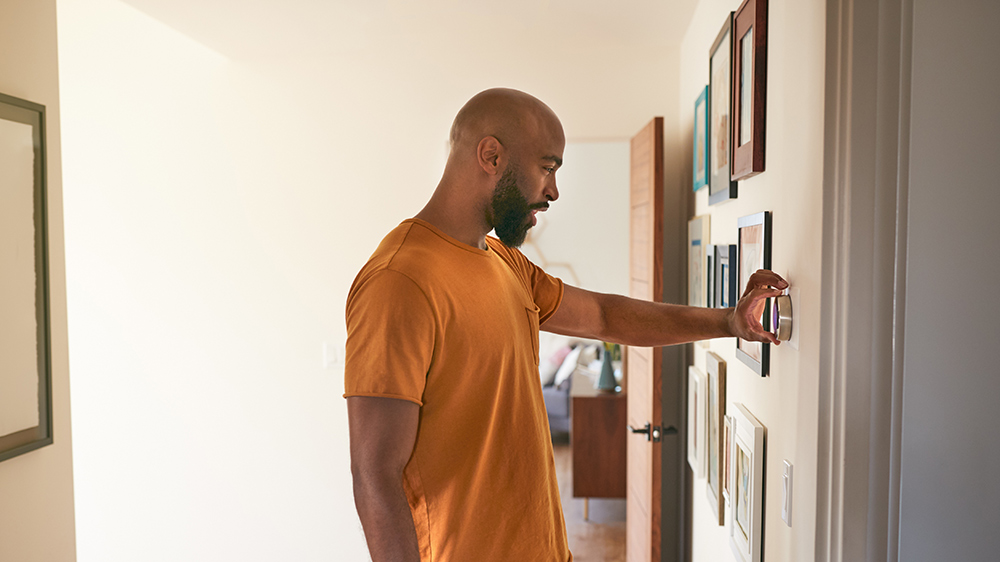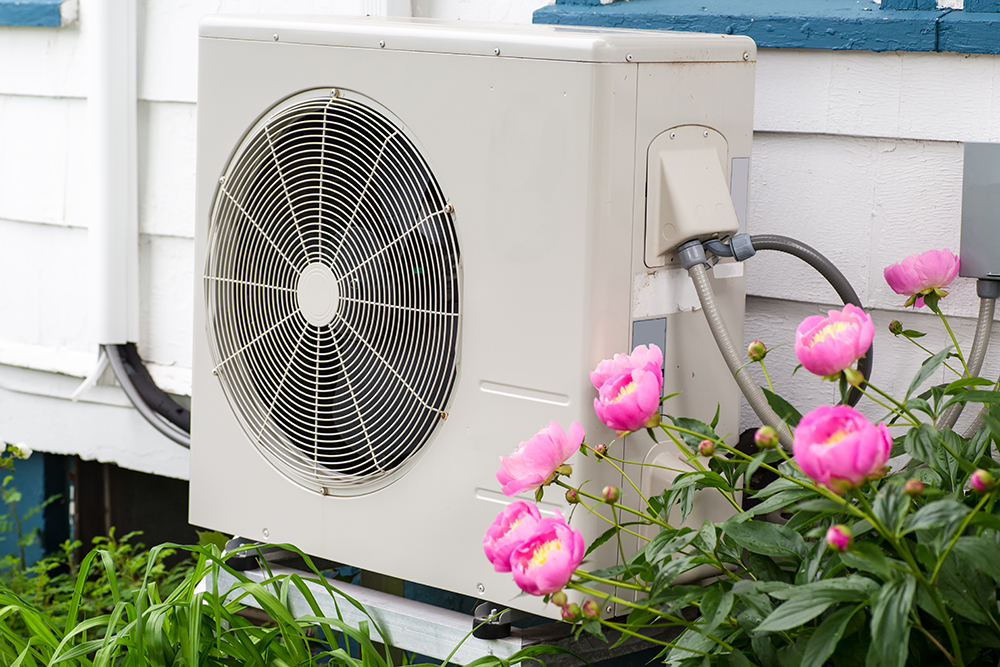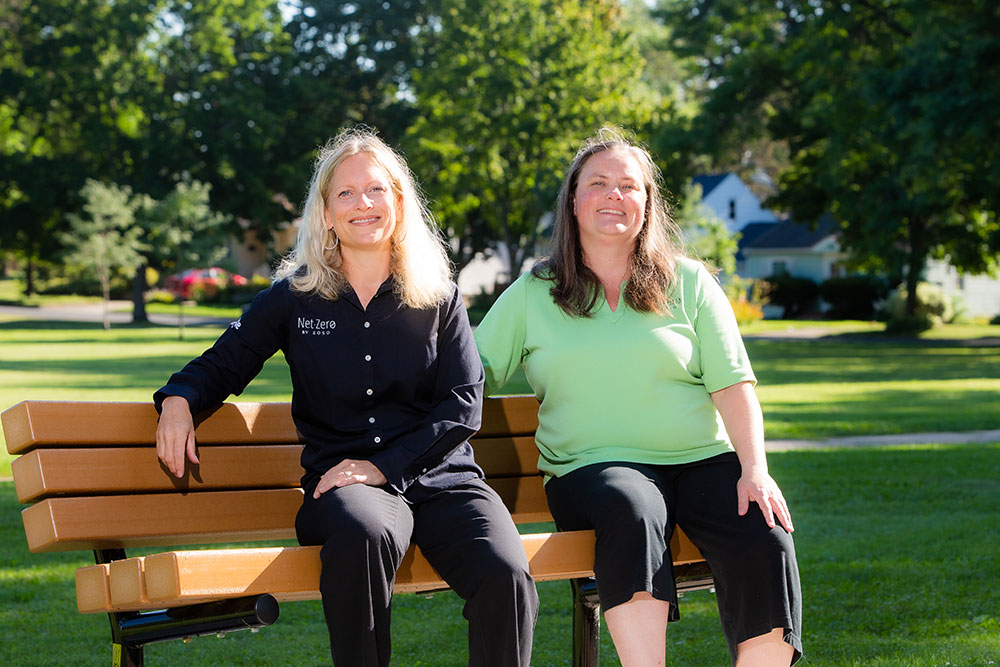
Heating and Cooling
Heating and cooling are typically the biggest energy users at home. Here are some simple tips to help you reduce your costs during the summer and winter months.
Set back to save
Setting back your thermostat can save you money. Before setting back:
- Check with your doctor if you have a medical condition that requires different temperatures.
- Check the owner's manual for your heating system to see if there is a recommended minimum temperature.
- If you have had problems with pipes freezing during extremely cold weather, correct the problem before setting the temperature back.
While setting your thermostat back is a way to save energy, depending on your heating system, a setback may not be right for you:
- Natural gas furnaces most effectively and efficiently heat a living space back to a desired temperature.
- Boilers and electric resistance heat can take longer to get a living space back to a desired temperature.
- Air source heat pumps (ASHP) are recommended to “set it and forget it.”
- If you have a dual-fuel approach (natural gas furnace and ASHP), larger temperature gains are most effectively achieved by the natural gas furnace. Once you have a living space back to the desired temperature, the ASHP is good at maintaining temperature.
Recommended thermostat settings:
| Home, Away or Sleeping | Winter* | Summer |
|---|---|---|
| When you're home | 68° | 78° |
| When you're not home | 60° | 85° |
| When you're sleeping | 60° | 78° |
*Or as low as health permits. Check the owner's manual for recommended temperature settings and if turning down the temperature for more than 24 hours.
Get a smart thermostat
Smart thermostats automatically adjust your household's heating and cooling systems, lowering the temperature when you're away in the winter or raising it in the summer. Like other smart devices, smart thermostats can be controlled remotely and automatically adjust to your household routine.
Learn about incentives opens in a new window
Skip the space heaters
When the days get chillier, resist using electric space heaters for heat. Using your furnace, even if it is for just a few hours a day, is more energy efficient than using a space heater.
Use ceiling fans
Ceiling fans help circulate air and reduce the need for heating or cooling. In the summer, set the fan to spin counterclockwise to create a cooling breeze. In the winter, reverse the direction to clockwise to push warm air down from the ceiling. Remember to turn the fan off when you leave the room.
Monitor moisture levels
It's important to stay ahead of the moisture level in your home to maximize energy efficiency. Ensure all downspouts are functioning and positioned well away from the foundation of your home. Keep your ENERGY STAR® dehumidifier set at 50% relative humidity. This will help your air conditioner work less to dehumidify. And, always use bathroom and kitchen exhaust fans during and after showers and cooking for at least 30 minutes.
Check your furnace filter
The furnace filter is a small part of your heating system but an important one. A clogged filter can inhibit airflow. It causes your furnace to work harder and use more energy. During heating season, check your filter monthly, and clean or replace it when it is dirty. And be sure to have a licensed HVAC professional inspect your system annually.
Consider a Heat Pump
Heat pumps are an energy-efficient, environmentally friendly option for heating and cooling homes in various climates, including the Midwest. Advances in technology make them a viable alternative to traditional HVAC systems—even in colder regions.
Explore heat pumps
Check your windows
Leaving windows unlocked allows the air to move in and out of the house as energy loss. It's common for the upper sash of a window to "fall down" a bit, leaving the top of a double-hung window open, which often goes unseen because of blinds or shades. Ensure this doesn't happen by locking your windows!
If you have any drafty windows, consider installing inexpensive window film to help keep the cool air out. These kits are sold at many stores and only require a household hairdryer to install.
Improve insulation
Insulation helps keep your home warm in the winter and cool in the summer. The attic is an easy place to add more insulation and can make a big difference. Use weatherstripping and caulk to seal gaps around windows, doors and other openings. And make sure your ducts are well-insulated so the air stays the right temperature.
Work with the sun
In the summertime, close blinds and drapes to help keep your home cooler during the day. In the winter, open window coverings during the day to take advantage of the heat from the sun and close them at night to reduce heat loss and drafts.
Questions?
Questions about heating and cooling your home? MGE’s Energy Experts can help!
Ask the experts
Rebates and Incentives
See if you're eligible for rebates, tax credits and other incentives.
Explore options
